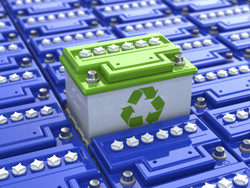Lithium batteries for electric vehicles
European automotive industry urgently needs companies that will massively produce lithium (Li)-ion batteries for electric vehicles (EVs) to face the strong competition, especially from Asia. To this end, scientists in the 'European Li-ion battery advanced manufacturing for electric vehicles' (ELIBAMA)(opens in new window) project are forging ahead on multiple fronts to improve battery manufacturing processes. One of the main components scientists are working on is the battery electrodes. Focus is placed on implementing cleanroom electrode manufacturing processes and eliminating the need for expensive and harmful organic solvents for anode and cathode coating. To decrease cell cost and increase production yield, scientists seek to reduce the electrolyte filling time and minimise the particle contamination risk during the filling process. Work is also geared toward improving the cell joining, stacking and assembly. Non-destructive testing algorithms should help distinguish between healthy and defective cells. Project members will collaborate on a lifecycle assessment study to provide an integrated environmental assessment of different technologies developed from electrode to cell level. Models have been developed to benchmark battery manufacturing processes and the ELIBAMA improved processes. A workshop has been devoted to battery recycling, refurbishing and recirculation with emphasis on logistics aspects, secure handling and cost-effective methods for battery disassembly. Furthermore, a lab-scale programme has been initiated on how to improve recycling efficiency. ELIBAMA paves the way for significantly improving manufacturing processes for EV battery electrodes and cells and making them more eco-friendly and less expensive.







